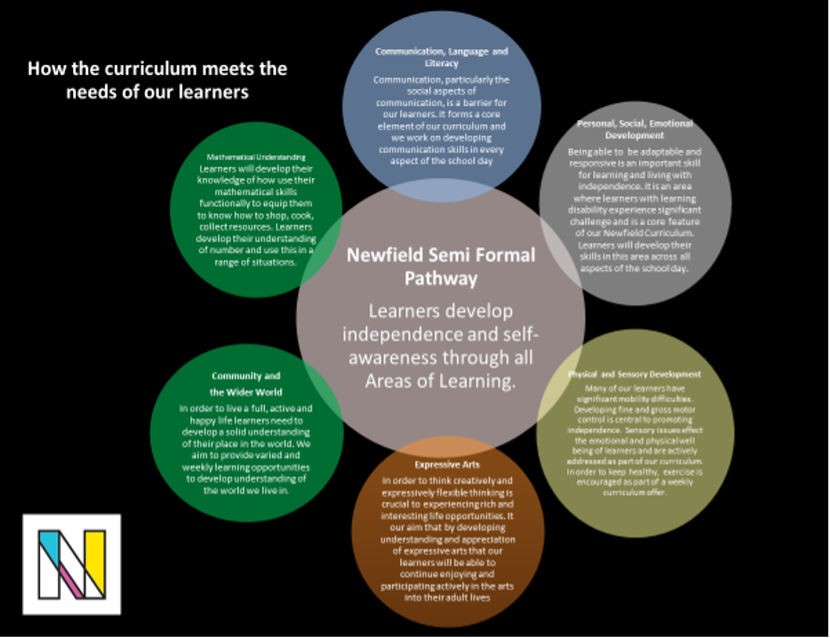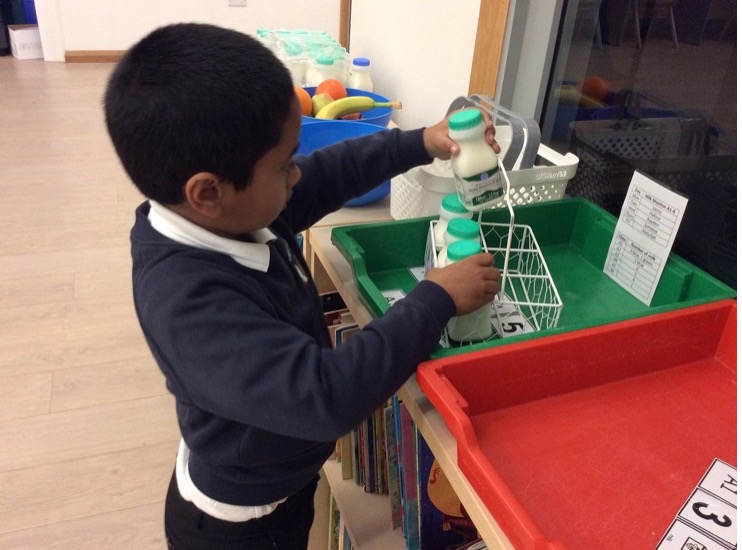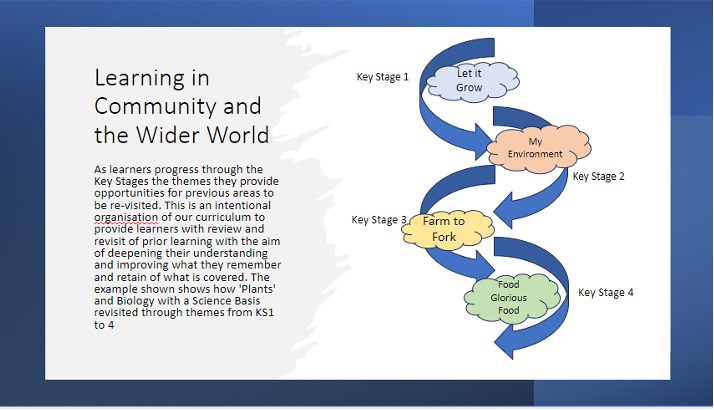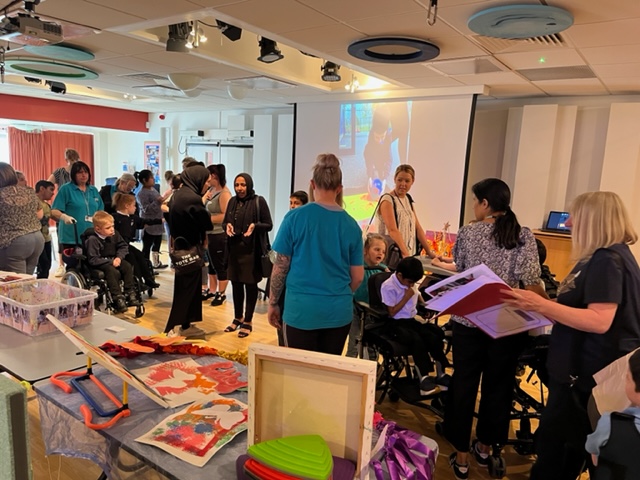Semi-Formal & Formal
Our Semi-Formal Pathway is designed to meet the needs of learners who are moving into more subject-specific areas of learning. The curriculum is organised into 6 areas which provide a broad and balanced thematic offer which gives the foundations on which to move into a formal curriculum.
Communication, Language and Literacy, Mathematical Understanding, Personal, Social, Emotional Development, Community and the Wider World, Physical Development and Expressive Arts form the basis for a thematic curriculum. The knowledge and skills taught in these areas helps our learners access a variety of new and interesting learning experiences while continuing to work on the core areas of need and outcomes from their EHCP.
Overview
Semi Formal Pathways - Learners who have severe and complex learning difficulties access a curriculum that builds upon their established learning to learn skills and extends their knowledge through subject-specific opportunities, these are meaningful and relevant and enable pupils to continue to develop lifelong functional skills (subject specific learning).
Learners will access the themes in a way relevant to theme and teachers ensure that all planned activities are as meaningful and relevant as possible. The progress of learners following the Semi-Formal Pathway will be tracked on an on-going basis via the Newfield Individual Schemes of Work and on Progression Steps (Bsquared).
Our Themes and Long Term Coverage for KS2, 3 and 4 for our Semi-Formal Pathway can be found here: Semi-Formal Theme Map

Very few of our learners progress onto a formal curriculum due to the nature of their complex needs. However, some of our semi-formal learners may develop more advanced skills in a particular area (a ‘spiky’ profile) which means they are able to access National Curriculum subject specific learning.
To ensure these learners are stretched and challenged the Newfield Individual Scheme of Work Frameworks extend to the National Curriculum coverage to enable teachers to track and push for progress for the learners whose ability allows this type of progress.
If ever any of our learners made progress so they were achieving age-related expectations, we would look to support them in a suitable mainstream environment to enable them to continue their learning in the most appropriate format to them.
Communication, Language and Literacy
We want our learners at Newfield School to be:
Effective Communicators
Semi-Formal Pathway
We are passionate about ensuring all of our learners are able to communicate in the means best suited to them. We support a Total Communication approach across the school to ensure every learner has an accessible means of communication and they are understood by those living and working with them.
Communication is at the heart of everything we do and whilst it will be feature of a Literacy lesson communication opportunities permeate all aspects of the curriculum and wider school day. In line with the wider local authority, we use the WellComm programme to inform and support the development of communication skills for our learners. More information on our approach to communication, and how we use WellComm can be found on our communication page.
We are keen for every learner to develop a love of reading and more information can be found about approach to reading in our Teaching Reading & Phonics section on our curriculum overview page.
Learners on the Semi-Formal pathway work towards gaining more independent skills in reading, writing and communicating following the school’s reading and writing individual schemes of work. Learners on the Semi-Formal pathway access the Twinkl Phonics systematic, synthetic scheme where they will learn to read and write through explicit phonics lessons. Learners on this pathway will be working towards enhancing their comprehension, spelling, punctuation and grammar and love of reading skills. Our learners will gain the skills that they need to become confident and independent readers through phonics, English and the wider curriculum. Learners are given the opportunity to develop their communication and expressive language skills through social skills lessons and leisure time. Learners within this pathway will work on developing their writing transcription skills such as letter formation, along with developing writing composition such as sentence structure through approaches such as colourful semantics. Learners are encouraged to write for different purposes across the curriculum and encouraged to generalise their skills.
Click below to access the English Reading and Writing Individual Schemes of Work:
English - Reading Individual Scheme of Work
English - Writing Individual Scheme of Work
Formal Pathway
For learners who are able to develop skills and knowledge within the Formal Pathway they will be given exposure to a wide range of opportunities to develop functional reading and writing and enhance their speaking and listening skills, across the entire curriculum. The Individual Frameworks for reading and writing will ensure their progression is tracked and challenged to make the best progress possible. Our learners will not only learn through explicit teaching in English sessions, but be exposed to, and encouraged to practice these skills across all subject areas and in various contexts. It is important that learners are able to reapply the skills confidently, in various settings, to prepare them for becoming young adults.
Information on Communication and Interaction for our pre-formal learners can be found here.
Mathematical Understanding
We want our learners at Newfield School to be:
Empowered and challenged to reach their individual potential
Quality teaching of Maths “provides a foundation for understanding the world, the ability to reason mathematically, an appreciation of the beauty and power of mathematics, and a sense of enjoyment and curiosity about the subject.” (Maths National Curriculum)
The teaching of Maths at Newfield School is therefore designed to be engaging and accessible to all our Semi-Formal learners. We aim to build on skills and knowledge guided by the National Curriculum and use resources from the White Rose Maths scheme, visual supports and practical activities to capture our learners’ attention and aid their understanding. Cross curricular links and opportunities to embed Mathematics into the everyday are capitalised to develop a love and enjoyment of Maths.
By building on prior knowledge and skills each year we aim to develop declarative knowledge, aiming for fluency and confidence across all areas of Maths and via cross-curricular links. Over time our learners will develop procedural knowledge, aiming to recognise and use methodology to complete practical tasks. Repeated exposure over the school year and across key stages supports the development of procedural fluency. Pupils work towards the application of this knowledge using conditional knowledge, focusing on reasoning skills and problem solving to complete Functional Skills Examinations and solve problems in everyday situations as they prepare for adulthood.
Semi-Formal Pathway
The teaching of Mathematical Understanding is important in helping our learners play an active role in the world around them. We strive for all learners to have a deep understanding of their mathematical knowledge and be able to use this in a range of situations as they move into adulthood.
The Mathematical Understanding element of the curriculum is delivered discretely though teachers will make connections with themes where meaningful ones exist. Learning opportunities to embed mathematical skills are capitalised on through all aspects of the curriculum to give learners various contexts through which to practice their skills, where suitable EHCP outcomes are incorporated into the teaching of Mathematical Understanding.
Focused Maths lessons with a focus on coverage of number, time, money and measure support the development of functional skills and long- term coverage planning ensures all strands of Maths are covered and re-visited to allow learners opportunity to re-cap on previous learning and develop their knowledge base at a deeper level. Real-life and day-to-day learning features consolidation of mathematical skills.
Click below to access the various key stage Maths Long term Coverage Documents and the Maths Individual Scheme of Work:
KS2 lower Termly Maths Coverage

Formal Pathway
As learners move on and begin to develop Mathematical Understanding within the Formal Pathway our Newfield Individual Scheme Framework ensures learners continue to make targeted and tracked progress within the subject. Maths lessons may feature starter activities to embed number skills, e.g. number bonds, times tables or learners may access interventions to develop their understanding or prepare them for Entry Level examinations. Extension activities are available via White Rose Maths to enhance independent learning and functional skills and learners are given opportunities to learn and practice new skills and then apply the skills into different contexts.
You can find more information about the Teaching of Maths at Newfield here.
Personal Social and Emotional Development
We want our learners at Newfield School to be:
As independent as possible
Happy, engaged and included members of their community
The Personal, Social and Emotional Development of our learners is at the core of all aspects of our curriculum and school life. We are committed to ensuring each learner is taught the knowledge and equipped with the skills to keep themselves safe, healthy and happy in as independent a way as they are able.
All of our learners have EHCP outcomes linked to their Personal, Social and Emotional Development and the progress learners make towards achieving these are tracked termly via our Evidence for Learning app. In addition to this the PSHE Assocation Planning Framework for Pupils with SEND is mapped across our thematic delivery to ensure all aspects are covered for both Semi-Formal and Formal Pathways.
The Planning Framework is organised into six sections:
- Self-Awareness (Me, who I am, my likes, dislikes, strengths and interests)
- Self-care, Support and Safety (Looking after myself and keeping safe; aspects of Relationships and Sex Education.)
- Managing Feelings (Understanding feelings, and that how I feel and how others feel affects choices and behaviour; aspects of Relationships and Sex Education)
- Changing and Growing (How I and others are changing; new opportunities and responsibilities; aspects of Relationships and Sex Education)
- Healthy Lifestyles (Being and keeping healthy, physically and mentally)
- The World I Live In (Living confidently in the wider world)
These areas are further broken down by Key Stage and then included into the thematic delivery across the planning cycle and adapted to the needs and understanding of individual learners as appropriate.
Click below to access the various key stage PSED Long term Coverage Documents and PSED Skills Framework:
KS2 lower Termly PSED Coverage
Newfield PSED policy
click here to view or downloadPhysical Development
We want our learners at Newfield School to be:
As independent as possible
Healthy in mind and body
At Newfield Schools all pupils are challenged to develop their physical skills, through a range of motivating activities throughout the week. We recognise the Government recommended 2 hours of physical education per week and we ensure our pupils achieve this through a range of ways including play times, free times, sensory and physical intervention, school sports and one weekly PE lesson.
At Newfield we recognise that teaching Fundamental Movement Skills is still at the core of learning for some pupils accessing a semi-formal curriculum due to their physical and sensory disabilities so teachers use assessments and planning within their groups to ensure children are taught these before moving onto more formal sports. Most children follow a programme of study in dance and gymnastics, multi-skills, games (striking, net and wall, fielding), outdoor adventure, circuit training and athletics.
Alongside our programme of study pupils may also have personalised MOVE, sensory circuits, MATP and Hydrotherapy programmes led by specialists in our school.
The PE Curriculum and Scheme of Work can be found here.
Community Sports Links
At Newfield we have started to develop links with our community, working with organisation such as Blackburn Rovers Football Club, Blackburn Sports Partnership as well beginning some links within local GLD cluster schools. We are excited to be introducing different sports and competitions to our students across all key stages.
For more information on how the PE and Sports Premium is being used to make additional and sustainable improvements to the primary PE, sports and physical activity offered please see the PE and Sports Premium section.
Movement Opportunities Via Education (MOVE)
Newfield School is a MOVE accredited school.
The MOVE therapy programme provides a framework to support the functional development of independent mobility and physical skills to the best of their ability. MOVE is a practical mobility programme based on the philosophy that movement is the foundation for learning. It uses a collaborative approach with families, carers, education and therapy staff working together to set purposeful, individualised targets for each child.
MOVE is appropriate for all ages and abilities to increase independent mobility, develop communication skills and improve health.
At Newfield School, we have 2 MOVE Leaders and many of our teachers are trained as Senior MOVE practitioners. The MOVE programme is delivered throughout the day and regular opportunities are created throughout the child’s normal daily routine for increased practice and progression of skills required to reach aspirational goals.
Parents are invited into MOVE sessions to work alongside their child and learn ways to support their child at home.
MOVE targets are discussed and set with parents during Annual Reviews and Parent Consultation meetings. Progress is recorded through the Evidence for Learning App.
Community and the Wider World
We want our learners at Newfield School to be:
Happy, engaged and included members of their community
Empowered and challenged to reach their individual potential
Community and the Wider World is the Area of Learning which our thematic delivery is mainly based around. It focuses on developing the knowledge, skills and experience learners need to understand the world around them and their place in it. In thematic study learners will cover aspects of the environment (immediate, local, global), understand how things work or how they are made, they will also develop cultural understanding as well as gaining an awareness of past and present. If they move into a Formal Pathway Community and the Wider World teaching will become more focused in delivery as Science, Geography, History and Computing.

Community and The Wider World coverage is broadly based upon the content of the EYFS Understanding of the World with early National Curriculum Science, Geography, History. When delivering Community and the Wider World (CWW) teachers will incorporate opportunities for learners to work on their EHCP outcome where possible. The cyclical nature of the coverage ensures retention of skills and opportunity to generalise skills.
Learner progress in CWW is captured via their progress on BSquared and via the tracking of their EHCP outcomes.
The thematic nature of the delivery nurtures curiosity and allows learners to ask questions and develop the skills they need to answer those questions. We aim to facilitate this curiosity with learning experiences which are both child led and adult led and the WOW events at the start and end of each theme are intended to capture learner interest and maximise engagement in the theme.
Learners are encouraged to develop their communication skills and consolidate cross curricular learning throughout the theme delivery.
Ultimately, we aim to prepare our learners for adulthood through an inclusive thematic curriculum to build confidence, social and cultural capital and raise aspirations, equipping pupils for the opportunities, responsibilities and experiences of future life
Click below to access the Community and the Wider World Long Term Coverage and Skills Framework documents:
Expressive Arts and Design
We want our learners at Newfield School to be:
Confident and committed to lifelong learning
Expressive Arts and Design is important is allowing learners to access enjoyable and enriched experiences throughout their lives and into adulthood. Many of our learners respond positively to music and can actively engage in the sensory experiences art-based learning activities provide for them. Design Technology offers an opportunity to blend creativity with technical know-how so learners are equipped with practical skills developed through hands on activities. Expressive Arts and Design coverage is thematic and linked to the termly theme. Learners will participate in performance, create 2D and 3D art work, use a range of media, develop a design process through to evaluation and listen to and play music. The coverage is derived from National Curriculum Art, Music and DT and differentiated to meet the needs of our learners.
As learners progress through the age-phases they have the opportunity to have their art work accredited via the Arts Award process. Skills worked on in Expressive Arts and Design may be linked to a learners EHCP (e.g. fine motor development) and are recorded and tracked termly where they do.
Art work is celebrated annually via our Art Exhibition where parents and carers are invited to celebrate the achievement, joy and creativity of the expressive arts.
Click below to access the Expressive Arts and Design Long Term Coverage and Skills Framework documents:

Assessment
Learners progress is monitored closely through their time at Newfield.
Their EHCP outcomes are tracked and evaluated termly with evidence collected and shared with parents and carers via the Evidence for Learning (EfL)app.
BSquared assessments are also completed summatively for our semi-formal learners.
See more information on how we track progress in the Assessment and Accreditation section.